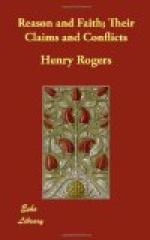In spite of the theory of Strauss, therefore, not less than that of Gibbon, the old and ever recurring difficulty of giving a rational account of the origin and establishment of Christianity still presents itself for solution to the infidel, as it always has done, and, we venture to say, always will do. It is an insoluble phenomenon, except by the admission of the facts of the—New Testament. ‘The miracles,’ says Butler, ’are a satisfactory account of the events, of which no other satisfactory account can be given; nor any account at all, but what is imaginary merely and invented.’
In the meantime, the different theories of unbelief mutually refute one another; and we may plead the authority of one against the authority of another. Those who believe Strauss believe both the theory of imposture and the theory of illusion improbable; and those who believe in the theory of imposture believe the theory of myths improbable. And both parties, we are glad to think, are quite right in the judgment they form of one another.
But what must strike every one who reflects as the most surprising thing in Dr. Strauss, is, that with the postulatum with which he sets out, and which he modestly takes for granted as too evident to need proof, he should have thought it worth while to write two bulky volumes of minute criticism on the subject. A miracle he declares to be an absurdity, an contradiction, an impossibility. If we believed this, we should deem a very concise enthymene (after having proved that postulatum though) all that it was necessary to construct on the subject. A miracle cannot be true; ergo, Christianity, which in the only records by which we know anything about it, avows its absolute dependence upon miracles, must be false.
It is a modification of one or other of these monstrous forms of unbelieving belief and Christian infidelity, that Mr. Foxton, late of Oxford, has adopted in his ‘Popular Christianity;’ as perhaps also Mr. Froude in his ‘Nemesis.’ It is not very easy, indeed, to say what Mr. Foxton positively believes; having, like his German prototypes, a greater facility of telling what he does believe, and of wrapping up what he does believe in a most impregnable mysticism. He certainly rejects, however, all that which, when rejected a century ago, left, in the estimate of every one, an infidel in puris naturalibus. Like his German acquaintances, he accepts the infidel paradoxes—only, like them, he will still be a Christian. He believes, with Strauss, that a miracle is an impossibility and contradiction—’incredible per se.’ As to the inspiration of Christ—he regards it as, in its nature, the same as that of Zoraster, Confucius, Mahomet, Plato, Luther, and Wickliffe—a curious assortment of ’heroic souls.’(Pp. 62, 63.) With a happy art of confusing the ‘gifts of genius’ no matter whether displayed in intellectual or moral power, and of forgetting that other men are not likely to overlook the difference, he complacently




